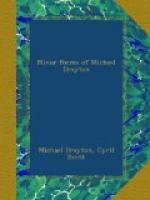Calling to minde since first my loue begunne, Th’ incertaine times oft varying in their course, How things still vnexpectedly haue runne, As please the fates, by their resistlesse force: Lastly, mine eyes amazedly haue scene, Essex great fall, Tyrone his peace to gaine, The quiet end of that long-liuing Queene, This Kings faire entrance, and our peace with Spaine, We and the Dutch at length our selues to seuer. Thus the world doth, and euermore shall reele, Yet to my goddesse am I constant euer; How ere blind fortune turne her giddy wheele:
Though heauen and earth proue both to mee vntrue,
Yet am I still inuiolate to you.
Sonnet 57
You best discern’d of
my interior eies,
And yet your graces outwardly
diuine,
Whose deare remembrance in
my bosome lies,
Too riche a relique for so
poore a shrine:
You in whome Nature chose
herselfe to view,
When she her owne perfection
would admire,
Bestowing all her excellence
on you;
At whose pure eies Loue lights
his halowed fire,
Euen as a man that in some
traunce hath scene,
More than his wondring vttrance
can vnfolde,
That rapt in spirite in better
worlds hath beene,
So must your praise distractedly
be tolde;
Most of all short,
when I should shew you most,
In your perfections
altogether lost.
Sonnet 58
In former times, such as had
store of coyne,
In warres at home, or when
for conquests bound,
For feare that some their
treasures should purloyne,
Gaue it to keepe to spirites
within the ground;
And to attend it, them so
strongly tide,
Till they return’d,
home when they neuer came,
Such as by art to get the
same haue tride,
From the strong spirits by
no means get the same,
Neerer you come, that further
flies away,
Striuing to holde it strongly
in the deepe:
Euen as this spirit, so she
alone doth play,
With those rich Beauties heauen
giues her to keepe:
Pitty so left,
to coldenes of her blood,
Not to auaile
her, nor do others good.
To Sir Walter Aston, Knight of the honourable
order
of the Bath, and my most
worthy
Patron
I will not striue m’
inuention to inforce,
With needlesse words your
eyes to entertaine,
T’ obserue the formall
ordinarie course
That euerie one so vulgarly
doth faine:
Our interchanged and deliberate
choise,
Is with more firme and true
election sorted,
Then stands in censure of
the common voice.
That with light humor fondly
is transported:
Nor take I patterne of another’s
praise,
Then what my pen may constantly
avow.
Nor walke more publique nor
obscurer waies
Then vertue bids, and iudgement
will allow;
So shall my tone,
and best endeuours serue you,
And still shall
studie, still so to deserue you.
Michaell
Drayton.




